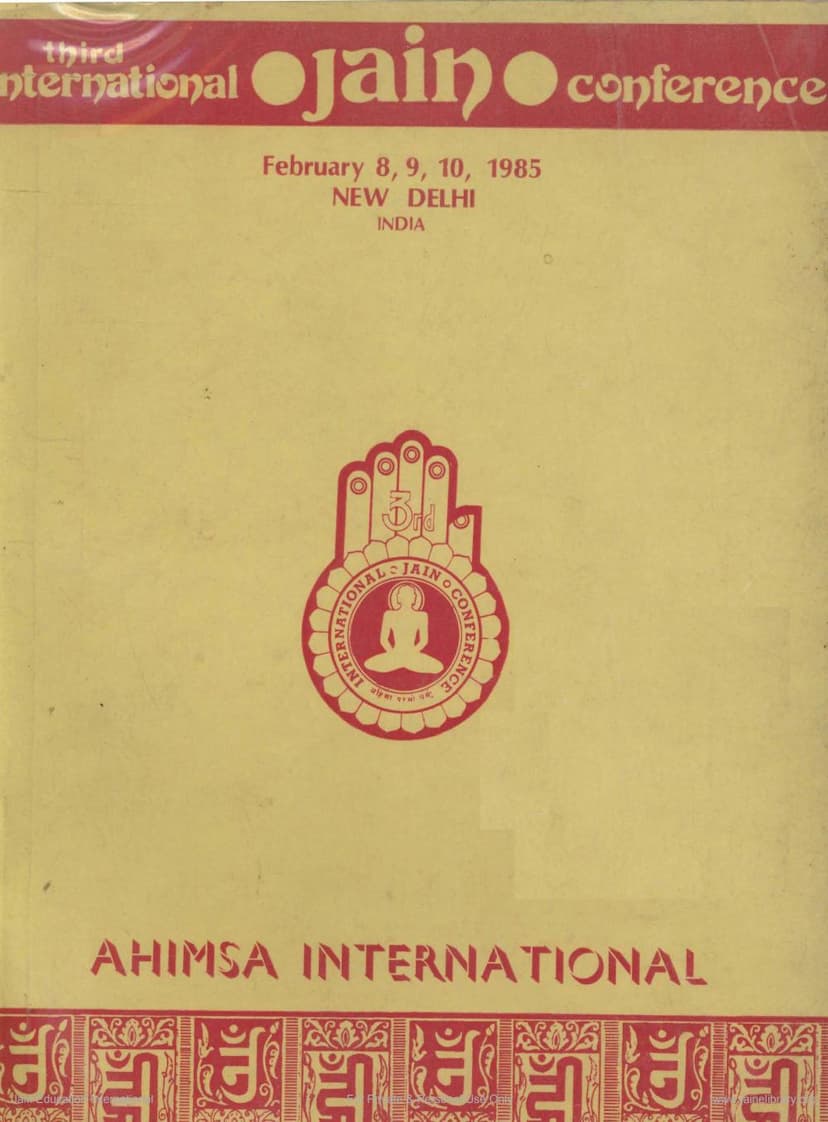International Jain Conference 1985 3rd Conference
Added to library: September 1, 2025

Summary
This is a comprehensive summary of the "International Jain Conference 1985 3rd Conference" Souvenir, based on the provided text:
Overview:
The Souvenir is a collection of scholarly articles and messages from prominent figures in the Jain community and academia, commemorating the Third International Jain Conference held in New Delhi, India, from February 8-10, 1985. Organized by Ahimsa International, the conference aimed to foster unity and brotherhood among Jains worldwide, propagate Jain doctrines, promote non-violence (Ahimsa) and vegetarianism, and address the spiritual and literary needs of the global Jain community.
Key Themes and Content:
The Souvenir is divided into an English and a Hindi section, featuring a wide range of topics related to Jain philosophy, culture, history, and practice. Some of the prominent themes include:
-
Jaina Philosophy and Metaphysics:
- Paryaya: A singular contribution of Jainism to world philosophy, explaining the modes of existence and modification of substances and attributes.
- Concept of Soul (Jiva): Discussed from a philosophical and scientific interpretation, highlighting its purity in the real sense (Nischaya Naya) and its apparent impurity due to karmic attachment (Vyavahara Naya). The concept of the soul as a magnetic field is explored as a potential scientific interpretation.
- Space, Time, and the Universe: Explores the Jain cosmological view, comparing it with modern scientific theories like Einstein's theory of Relativity. The six substances (Jiva, Pudgala, Dharma, Adharma, Akasha, Kala) and their characteristics are detailed.
- Anekantavada and Syadvada: The Jain principles of manifold viewpoints and conditional predication are highlighted as crucial for understanding reality, promoting intellectual tolerance, and fostering social harmony.
- Jaina Mysticism: The paper delves into the path of spiritual realization in Jainism, outlining stages like spiritual awakening, purgation, illumination, the dark night of the soul, and transcendental life, emphasizing the role of virtues and austerities.
- Namokara Maha Mantra: Analyzed as a powerful mantra for self-awakening, representing five stages of self-development and consciousness, and its profound philosophical and spiritual significance.
-
Ahimsa (Non-Violence) and Vegetarianism:
- This is a central theme throughout the Souvenir. Articles discuss the comprehensive nature of Ahimsa in Jainism, extending beyond mere abstinence from violence to encompass love, compassion, and respect for all life.
- The positive content of Ahimsa is explored, linking it to goodwill and the imperative to control negative mental states.
- The close relationship between Ahimsa and vegetarianism is emphasized, with detailed discussions on the health benefits of vegetarianism and the ethical considerations of meat consumption.
- The impact of diet on behavior and the scientific basis for vegetarianism are presented.
-
Jain Culture and Heritage:
- Art and Iconography: The Souvenir features articles on Sarasvati in Jaina art, the art and iconography of Jaina caves at Ellora, and various Jaina temples and icons across India, showcasing the rich artistic traditions of Jainism.
- Contributions to Indian Culture: Several articles highlight the significant contributions of Jainism to Indian culture in ethical, social, philosophical, and scientific spheres, including its influence on literature, mathematics, art, and social reforms.
- Jaina Literature: The development and richness of Jaina literature in various languages, including Prakrit, Sanskrit, Rajasthani, Kannada, and Hindi, are discussed, emphasizing its role in preserving ancient Indian knowledge and cultural heritage.
- Role of Lay-Votaries and Women: The importance of lay followers in the propagation and sustenance of Jainism is discussed, along with the status of women in Jainism, acknowledging their significant contributions and spiritual aspirations.
- Jainism in Buddhist Literature: The historical and philosophical interactions and influences between Jainism and Buddhism are explored.
-
Practical Aspects and Global Relevance:
- Jain Yoga: The concept of Yoga in Jainism is presented, focusing on the control and cessation of activities as a path to self-realization.
- Siddhachalam and Jain Centers: The establishment of Siddhachalam in the USA as an international center for Ahimsa and the growth of Jain communities and societies in North America and worldwide are highlighted.
- Relevance in the Present World: The articles emphasize the timeless relevance of Jain principles like Ahimsa, Anekantavada, and Aparigraha for addressing contemporary global issues such as violence, conflict, environmental degradation, and the need for mental peace.
- Jain Mantra Vidya: The scientific basis and efficacy of Jain mantras, particularly the Namokara Maha Mantra, are discussed, highlighting their role in spiritual development and well-being.
- Jainism and World Peace: The principles of Jainism are presented as a crucial pathway to achieving global peace and harmony.
Key Figures and Organizations:
- Ahimsa International: The organizing body of the conference, dedicated to propagating Ahimsa and Vegetarianism.
- Chief Editor (Satish Kumar Jain) and Executive Editor (Dr. Kamal Chand Sogani): Highlighted for their efforts in compiling the Souvenir.
- Advisory Board and Board of Editors: Composed of eminent scholars and authorities in Jain studies.
- Patrons and Contributors: The Souvenir acknowledges the extensive support from numerous individuals, centers, and institutions from India and abroad, including messages from the President and Vice-President of India.
- Spiritual Advisors: Prominent Jain Acharyas like Acharya Sushil Kumarji Maharaj and others provided blessings and guidance.
Overall Significance:
The Souvenir serves as a testament to the vibrant global Jain community and its commitment to preserving and promoting Jain teachings. It showcases the depth and breadth of Jain philosophy, its rich cultural heritage, and its enduring relevance in the modern world, particularly its emphasis on non-violence, compassion, and ethical living as solutions to contemporary challenges.